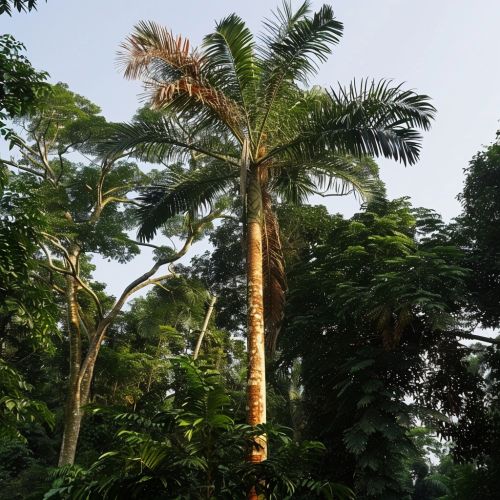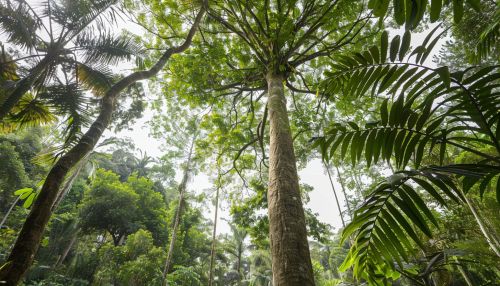Okoume tree
Description
The Okoume tree, scientifically known as Aucoumea klaineana, is a tropical hardwood species native to the equatorial regions of West Africa, particularly Gabon, Equatorial Guinea, and the Republic of Congo. This tree is highly valued for its lightweight, workable timber, which is extensively used in the plywood industry. The Okoume tree belongs to the family Burseraceae and is the only species within the genus Aucoumea.


Taxonomy and Nomenclature
The Okoume tree was first described scientifically by the French botanist Jean Baptiste Louis Pierre in the late 19th century. The genus name Aucoumea is derived from the local Gabonese name for the tree, while the species epithet klaineana honors the French missionary and botanist Auguste Jean Marie Klaine, who collected the type specimen.
Morphology
The Okoume tree can reach heights of up to 60 meters, with a trunk diameter of up to 2 meters. It has a straight, cylindrical bole, which is often free of branches for the first 30 meters. The bark is smooth and grayish-brown, often peeling in thin scales. The leaves are alternate, pinnately compound, with 5-7 leaflets that are oblong and glossy green. The flowers are small, white, and arranged in terminal panicles. The fruit is a drupe, containing a single seed.
Distribution and Habitat
Okoume trees thrive in the humid tropical rainforests of Central Africa. They are predominantly found in Gabon, which accounts for the majority of Okoume timber production. The species prefers well-drained, sandy soils and is commonly found in lowland forests, often forming pure stands. Okoume trees are adapted to the high rainfall and warm temperatures of their native habitat.
Ecological Role
The Okoume tree plays a significant role in its ecosystem. It provides habitat and food for various wildlife species, including insects, birds, and mammals. The tree's flowers attract pollinators, while its fruits are consumed by animals, aiding in seed dispersal. Additionally, Okoume trees contribute to the forest structure and dynamics, influencing light penetration and understory vegetation.
Economic Importance
The primary economic value of the Okoume tree lies in its timber. Okoume wood is lightweight, with a density of approximately 0.43 g/cm³, and has a fine, even texture. It is easy to work with, making it highly sought after for the production of plywood, veneers, and other wood-based products. Gabon is the leading exporter of Okoume plywood, which is used globally in construction, furniture, and boat building.
Silviculture and Management
Sustainable management of Okoume forests is crucial to prevent overexploitation and ensure long-term availability. Silvicultural practices include selective logging, controlled regeneration, and the establishment of plantations. Research on the growth rates, genetic diversity, and ecological requirements of Okoume trees is essential for developing effective management strategies.
Conservation Status
The Okoume tree is currently not listed as endangered, but its populations are threatened by illegal logging, habitat loss, and unsustainable harvesting practices. Conservation efforts focus on promoting sustainable forestry practices, enforcing logging regulations, and protecting critical habitats. International organizations and local governments are working together to ensure the conservation of Okoume forests.
Uses and Applications
Okoume wood is prized for its versatility and aesthetic appeal. It is commonly used in the manufacture of marine plywood, which is resistant to water and decay, making it ideal for boat construction. The wood's light color and smooth surface make it suitable for high-quality furniture and interior paneling. Additionally, Okoume veneers are used in decorative applications, providing an attractive finish for various products.
Challenges and Future Prospects
The future of Okoume timber production faces several challenges, including illegal logging, climate change, and competition from alternative materials. Addressing these challenges requires a multifaceted approach, involving policy reforms, technological advancements, and community engagement. Research on the ecological and economic aspects of Okoume forestry will be vital in developing sustainable solutions.
